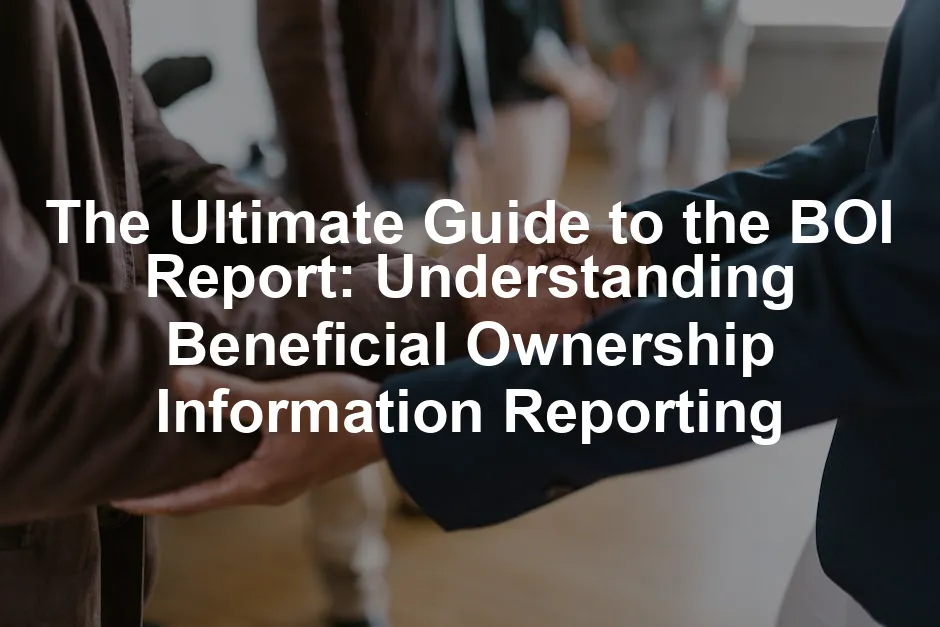Introduction
In an era where transparency is key to combating financial crimes, the introduction of Beneficial Ownership Information (BOI) reporting has certainly made waves. As of January 1, 2024, companies across the United States must comply with new regulations designed to unveil the hidden figures behind corporate curtains. This guide will delve into everything you need to know about BOI reporting, from its implications to filing requirements, and even its potential impact on small businesses. Buckle up, because understanding the BOI report might just be the most crucial business knowledge you acquire this year!
If you’re looking to deepen your understanding of corporate law, check out “The Corporate Transparency Act: A Comprehensive Guide”. It’s like having a cheat sheet for navigating the complexities of corporate law.

Summary
The Beneficial Ownership Information (BOI) report is a new requirement under the Corporate Transparency Act (CTA), mandating various entities to disclose their beneficial owners to the Financial Crimes Enforcement Network (FinCEN). This legislation is aimed at reducing corporate anonymity and preventing illicit activities like money laundering and fraud. The BOI report must include detailed information about individuals who directly or indirectly own or control a company.
Starting January 1, 2024, existing companies must file their reports by January 1, 2025, while newly formed entities have a 90-day window to comply. Exemptions apply to certain entities, including publicly traded companies and large operating companies meeting specific criteria. Failure to comply can lead to severe penalties, including fines and imprisonment.
If you’re a budding entrepreneur, you might find yourself asking, “Where do I start?” Well, grab a copy of “Start Your Own Business: The Only Startup Book You’ll Ever Need”. It’s packed with insights that can help you avoid the pitfalls of new ventures.
This guide will cover:
- What a BOI report entails
- Who is required to file
- The process for filing and updating information
- The legal implications and penalties for non-compliance
- Resources available for businesses to ensure compliance

What is a BOI Report?
The Beneficial Ownership Information (BOI) report is a crucial document under the Corporate Transparency Act (CTA). It aims to shine a light on the individuals who truly own or control a company. Think of it as a corporate selfie, but instead of a duck face, you get a peek at the real owners behind the business.
The CTA was introduced to combat financial crimes and promote transparency. By requiring businesses to disclose their beneficial owners, the government aims to tackle issues like money laundering and tax evasion. This is a big deal, as it helps create a clearer picture of who is pulling the strings in the business world.
If you’re curious about the broader implications of entrepreneurship, consider reading “The Lean Startup: How Today’s Entrepreneurs Use Continuous Innovation to Create Radically Successful Businesses”. It’s a must-read for anyone looking to innovate in their business approach!
Why is this important? Well, without BOI reporting, bad actors could easily hide behind shell companies, making illicit activities harder to trace. Imagine trying to catch a ghost – much harder without a map! The BOI report provides that map, allowing authorities to track down the real owners and their activities.
In summary, a BOI report is more than just a form. It’s a vital tool for ensuring businesses operate transparently and responsibly. This new requirement will significantly impact how companies manage their ownership structures, pushing for a cleaner, more accountable corporate environment.

Who Needs to File a BOI Report?
Not all companies need to file a BOI report, but many do. So, who exactly qualifies? Let’s break it down.
First, we have domestic reporting companies. This category includes corporations, limited liability companies (LLCs), and similar entities created in the U.S. If you’ve formed a business and filed documents with a secretary of state, you’re likely a reporting company. However, if you’re a sole proprietor or in a general partnership, you’re off the hook.
Now, what about foreign businesses? If a foreign entity registers to do business in the U.S., it falls under the same reporting obligations. So, whether you’re based in New York or New Delhi, if you’re operating here, BOI reporting applies.
If you’re looking for insights on effective leadership, grab a copy of “Start with Why: How Great Leaders Inspire Everyone to Take Action”. It’s a game-changer for anyone looking to motivate their team!
But not every business has to file. The CTA has exemptions for certain entities. For example, publicly traded companies, some nonprofits, and large operating companies with specific criteria may not need to report. A large operating company typically has over 20 employees and more than $5 million in gross receipts. If you fit into one of these categories, you can breathe a sigh of relief.
In conclusion, while many businesses must file a BOI report, there are exemptions. If you’re unsure whether your company needs to report, it’s wise to consult a professional. Better safe than sorry!

Reporting Requirements and Information Needed
Filing a BOI report isn’t just a matter of filling out a form and calling it a day. There are specific details you must provide, and they can be quite personal.
To start, each beneficial owner must be identified, which means sharing their name, date of birth, and residential address. Additionally, you’ll need to provide an identifying number from a government-issued ID, like a driver’s license or passport. If you think that sounds like a lot, wait until you hear about the company applicant!
Newly formed companies must also disclose information about the individuals who filed the formation paperwork. This means you’ll need to list not just the owners but also those who helped create the business. It’s like a family reunion, but instead of relatives, you’re showcasing the people behind your company.
For companies established before January 1, 2024, the deadline to file is January 1, 2025. Newly formed companies, however, must submit their information within 90 days of registration. It’s essential to keep your information updated, as any changes in ownership or control require immediate filing.
And while you’re organizing your business documents, consider investing in a set of Rubbermaid Brilliance Food Storage Containers. They’re perfect for keeping your documents safe and sound!

The Filing Process: How to Submit a BOI Report
Filing a BOI report might sound daunting, but it’s more straightforward than trying to assemble IKEA furniture without instructions. The process typically involves online submission through the FinCEN’s Beneficial Ownership Secure System (BOSS).
To get started, you’ll need to create a FinCEN ID, which helps streamline your filing process. This ID is optional, but it can save you time in the long run. Once you have your ID, you’ll fill out the required information about your beneficial owners and company applicants.
Speaking of efficiency, why not equip yourself with a portable charger to ensure your devices stay powered during the filing process? You’ll thank yourself later!
Deadlines are crucial here! Existing companies must file their reports by January 1, 2025. If your business is newly formed, you have a 90-day window from the date of registration. Remember, timing is everything in the filing world!
Updating your information is just as important as filing it. If there are any changes in ownership, you must file an update within 30 days of the change. Keeping your records current ensures you stay compliant and avoid potential penalties.
In summary, the filing process for a BOI report is designed to be user-friendly. Follow the steps, meet the deadlines, and keep your information accurate. That way, you can focus on running your business and leave the worries about compliance behind!

Consequences of Non-Compliance
Ignoring BOI reporting can lead to serious consequences, and we’re not talking about a mild slap on the wrist. The penalties can be hefty, with civil fines reaching up to $500 per day. Ouch!
But that’s not all. Willful violations can result in criminal fines of up to $10,000 and potential imprisonment for up to two years. In other words, the stakes are high, and the government isn’t playing around.
Real-world examples of penalties for non-compliance show that this isn’t just a theoretical concern. Companies that neglect their reporting obligations may face severe repercussions, damaging their reputation and financial stability.
Moreover, the broader legal implications of failing to comply with BOI reporting can create a ripple effect. It can lead to heightened scrutiny from banks and financial institutions, making it challenging to secure loans or financing.
For those looking to enhance their business acumen, consider picking up “Good to Great: Why Some Companies Make the Leap… and Others Don’t”. It’s a fantastic resource for understanding what sets successful companies apart!
In essence, the consequences of non-compliance are severe and far-reaching. It’s crucial for businesses to stay informed and ensure they meet their reporting obligations to avoid these pitfalls. Understanding the impact of paternity fraud statistics can also shed light on the broader implications of compliance failures.

Understanding the impact of compliance failures is crucial for businesses. Paternity fraud statistics can provide insights into the broader implications of non-compliance.
Resources and Assistance for Compliance
Fortunately, businesses don’t have to navigate the BOI reporting maze alone. FinCEN offers a wealth of resources to help you understand and comply with the new regulations. Their website features a Small Entity Compliance Guide, FAQs, and even instructional videos.
If you need more personalized assistance, consider reaching out to compliance specialists or legal firms that specialize in BOI reporting. They can guide you through the process and ensure you meet all requirements.
Additionally, best practices for compliance include maintaining organized records and staying up to date with any changes to regulations. Regularly review your ownership structure to ensure it aligns with BOI requirements.
And while you’re at it, why not grab a Hydro Flask Water Bottle to stay hydrated while you work on compliance! Staying hydrated keeps your mind sharp.

In conclusion, take advantage of the resources available to help you comply with BOI reporting. By staying informed and seeking assistance when needed, you’ll navigate this new landscape with confidence.
FAQs
What is the deadline for filing a BOI report?
Companies registered before January 1, 2024, must file their initial BOI report by January 1, 2025. Newly created companies have a 90-day window from their registration date to submit their report.
What information is required in a BOI report?
A BOI report must include each beneficial owner’s full legal name, date of birth, address, and an identifying number from a government-issued ID, such as a driver’s license or passport. Newly formed companies must also report information about the individuals who filed their formation paperwork.
Who qualifies as a beneficial owner?
A beneficial owner is an individual who owns at least 25% of the company or exercises substantial control over it. This can include senior executives and those with significant decision-making authority.
What are the penalties for not filing a BOI report?
Failing to file can result in civil penalties of up to $500 per day. For willful violations, companies could face criminal fines of up to $10,000 and imprisonment for up to two years.
Are there any resources available for assistance?
Yes! The FinCEN website offers a Small Entity Compliance Guide, FAQs, and instructional videos. Additionally, businesses can seek help from compliance specialists or legal firms knowledgeable about BOI reporting.
Please let us know what you think about our content by leaving a comment down below!
Thank you for reading till here 🙂
All images from Pexels




